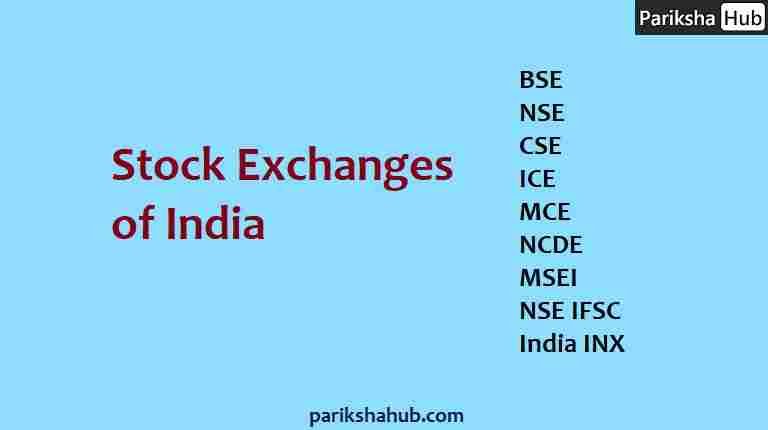A stock exchange is a facility where stocks are traded. The stock exchanges do not own the stocks. In order to trade in a stock exchange, the enterprises must be listed in that particular stock exchange. The smaller, riskier, and less liquid companies which are not listed on the stock exchanges are traded over the counter (OTC).
The Indian Capital Markets are regulated and monitored by the Ministry of Finance, The Securities and Exchange Board of India(SEBI), and The Reserve Bank of India(RBI). The SEBI is the regulatory authority established under the SEBI Act 1992. SEBI is the principal regulator for Stock Exchanges in India. Its functions include protecting investor interests, promoting and regulating the Indian securities markets. Stock Exchanges in India, as entities regulated by SEBI, undergo regular inspections to ensure compliance.
List of Stock Exchanges in India
| Sr. No. | Name of the Recognized Stock Exchange | Location | Recognition Valid Upto |
| 1 | Bombay Stock Exchange Ltd. (BSE Ltd) | Mumbai | PERMANENT |
| 2 | National Stock Exchange Ltd (NSE Ltd) | Mumbai | PERMANENT |
| 3 | Calcutta Stock Exchange Ltd | Kolkata | PERMANENT |
| 4 | Indian Commodity Exchange Ltd | Mumbai | PERMANENT |
| 5 | Multi Commodity Exchange of India Ltd | Mumbai | PERMANENT |
| 6 | National Commodity & Derivatives Exchange Ltd | Mumbai | PERMANENT |
| 7 | Metropolitan Stock Exchange of India Ltd | Mumbai | Sep 15, 2021 |
| 8 | NSE IFSC Ltd | Gandhi Nagar | May 28, 2021 |
| 9 | India International Exchange (India INX) | Gandhi Nagar | Dec 28, 2020 |
Important Facts about Stock Exchanges in India
Bombay Stock Exchange
- Bombay Stock Exchange Limited(BSE) was established in 1875 and is Asia’s first stock exchange.
- The BSE is the world’s 10th largest stock exchange.
- The Bombay stock exchange was founded by Premchand Roychand.
- Sensex(BSE 30), is the market index consisting of companies listed on the Bombay Stock Exchange (BSE).
- The index is the measurement of the value of a section of the stock market. The index is computed from the prices of selected stocks. An index is an indicator of market movement.
- BSE established India International Exchange (India INX) in December 2016.
- India INX is the first international exchange of India.
National Stock Exchange
- The National Stock Exchange India Limited(NSE) was founded in 1992 and started trading in 1994.
- The BSE had more than 5,000 listed firms, whereas the rival NSE had about 1,600.
- NSE is the first demutualized electronic exchange in the country.
- NSE was the first exchange in India to provide a modern, fully automated screen-based electronic trading system.
- NSE IFSC is a fully-owned subsidiary company of the National Stock Exchange of India.
- The NIFTY 50 is the NSE’s index.
- Nifty is owned and managed by India Index Services and Products (IISL).
- The base year of Sensex is 1978-79 and the base value is 100.
- The base year of NIFTY is 1995 and the base value is set to 1000.
- If the Sensex or Nifty goes up, it means most of the stocks in India went up during that given period.
- The fall in the Sensex /NIFTY was analogous to the recession. Fall in Sensex means people were selling their shares and leading to an economic crisis in the country.
- The normal trading time for the equity market is between 9:15 am to 03:30 pm, and for the commodity (MCX) market is between 10:00 AM to 11:30 PM, Monday to Friday.
- One can buy stocks on exchange working days between 9:15 AM to 3:30 PM on BSE and NSE.
- For trading in Indian stocks, one needs to have both a Demat and trading accounts.
- You cannot walk in the stock exchange to buy/sell your stocks for this you need the service of any stock brokers.
